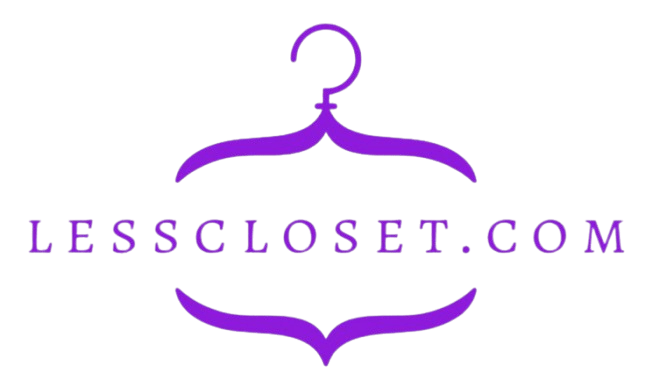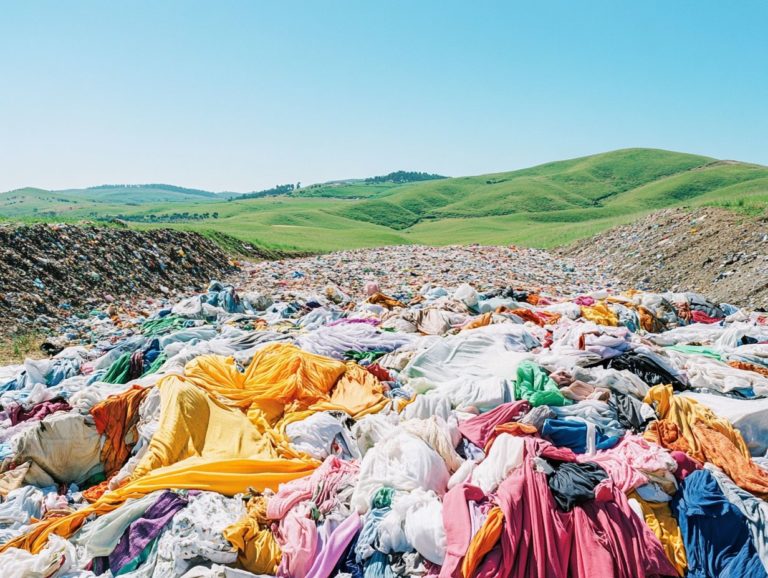How to Identify Sustainable Clothing Labels
As the fashion industry comes under heightened scrutiny regarding its environmental and social impacts, your understanding of sustainable clothing is more crucial than ever.
Discover what makes clothing truly sustainable and how you can make a difference! This article explores the importance of making mindful fashion choices and how to spot trustworthy sustainable labels.
Whether you’re refreshing your wardrobe or simply curious about ethical brands, you’ll find practical tips and insights designed to empower you as you navigate the realm of sustainable fashion with confidence.
Embark on this journey toward a more responsible way of dressing and embrace the change.
Contents
- Quick Tips:
- Understanding Sustainable Clothing
- Why Sustainable Clothing Matters
- Identifying Sustainable Clothing Labels
- Evaluating a Brand’s Sustainability Practices
- Making Sustainable Clothing Choices
- Frequently Asked Questions
- What are sustainable clothing labels?
- Why is it important to identify sustainable clothing labels?
- How can I identify sustainable clothing labels?
- What are some sustainable materials used by clothing labels?
- How can I research a clothing label’s sustainability practices?
- What are the benefits of supporting sustainable clothing labels?
Quick Tips:

- Look for certifications and labels such as Fair Trade, Organic, and B Corp to identify sustainable clothing.
- Research a brand’s sustainability practices by evaluating their ethical and environmental efforts.
- Incorporate sustainable clothing into your wardrobe by choosing quality items, supporting ethical brands, and opting for secondhand or rental options.
Understanding Sustainable Clothing
Sustainable clothing is important for conscious consumers. Awareness about the environmental impact of purchases is growing.
Sustainable fashion involves practices that prioritize ethical production, use eco-friendly materials, and ensure transparency throughout the supply chain.
This comprehensive approach aims to minimize waste and foster a circular fashion model. It ensures that your clothing choices are not only environmentally sound but also socially responsible. You must examine the entire lifecycle of a garment from its production and use to its eventual disposal or recycling.
By embracing sustainable clothing, you play a pivotal role in shaping a more equitable and eco-friendly fashion industry while avoiding misleading claims from brands.
What Makes Clothing Sustainable?
Clothing is sustainable when it’s made from eco-friendly materials. It also follows ethical production practices that significantly reduce its environmental impact.
This includes using organic cotton, which avoids harmful pesticides and nurtures healthier soil and ecosystems. Materials like hemp, linen, and Tencel are gaining popularity for their low-impact cultivation processes.
To ensure that your garments are made under good working conditions, look for certifications such as Fair Trade Certified. The OEKO-TEX Standard 100 ensures that textiles are free from harmful substances.
To genuinely engage with this movement, recognize and challenge the misleading claims some brands use to appear environmentally friendly. Identifying authentic sustainability claims means seeking out reputable certifications and understanding the lifecycle of sustainable clothing behind the brand.
Why Sustainable Clothing Matters
Sustainable clothing matters immensely because it directly tackles the pressing challenges of climate change and labor exploitation. Choose sustainable options today and show your commitment to a better planet!
Environmental and Social Impacts
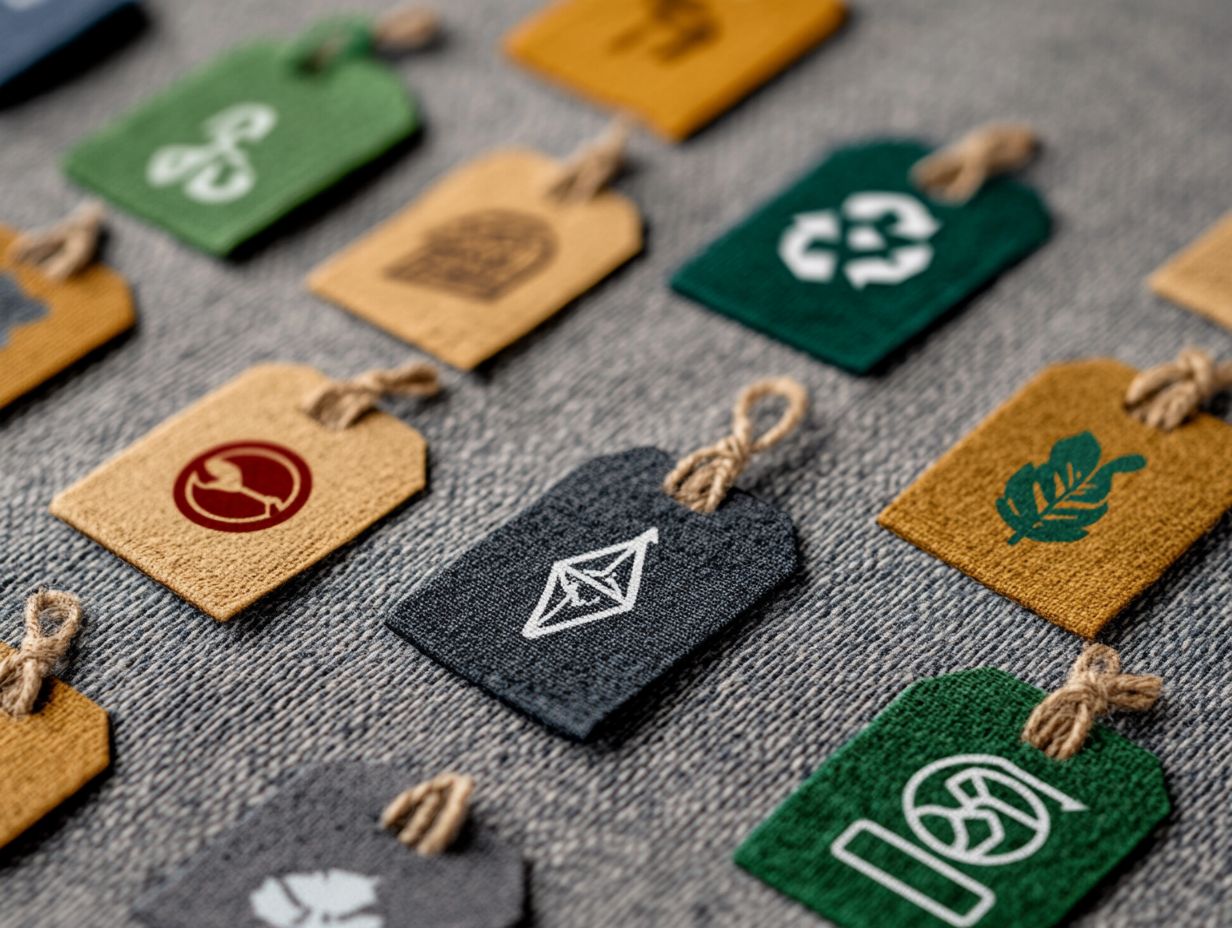
The environmental and social impacts of the fashion industry are profound, affecting ecosystems and communities across the globe.
Traditional clothing production brings significant environmental challenges. Water pollution from toxic dyes and chemicals contaminates waterways, harming aquatic life and impacting local communities.
The industry significantly contributes to carbon emissions due to manufacturing processes and long-distance transportation of goods.
On the social front, ethical labor practices often take a back seat. Many workers find themselves in unsafe conditions, earning wages that barely allow them to survive.
Certifications like the Global Organic Textile Standard provide a fantastic opportunity to support ethical brands by ensuring that environmental and labor standards are upheld.
Certified B Corporations also play a vital role, promoting sustainable practices that benefit not just profits but people and the planet.
Identifying Sustainable Clothing Labels
Identifying sustainable clothing labels is essential for discerning consumers. It helps you make informed, eco-friendly purchases that resonate with your values, especially through understanding Supply Chain Transparency.
Supply chain transparency means knowing where and how your clothes are made. By choosing brands that prioritize sustainability, you enhance your wardrobe and contribute to a healthier planet.
Certifications and Labels to Look For
When you look for sustainable clothing, seek specific eco-friendly certifications that guarantee ethical and environmentally responsible practices.
These certifications act as a seal of approval, underscoring the brands’ commitments to fair labor practices and stringent environmental standards.
- Fair Trade USA and Fair Trade International ensure artisans and workers earn fair wages and work in safe conditions, championing social equity.
- The Leather Working Group certifies leather producers based on their environmental compliance, ensuring that the tanning process minimizes chemical waste and energy consumption.
By focusing on these certifications, including the Global Organic Textile Standard, you can make informed choices that benefit the planet and support humane labor practices.
Evaluating a Brand’s Sustainability Practices
Evaluating a brand’s sustainability practices requires thorough research into its supply chain transparency, ethical labor practices, and the utilization of sustainable materials.
Looking into these aspects gives you a comprehensive understanding of the brand’s commitment to sustainability and its overall impact on the environment.
Researching and Assessing a Brand’s Ethical and Environmental Practices
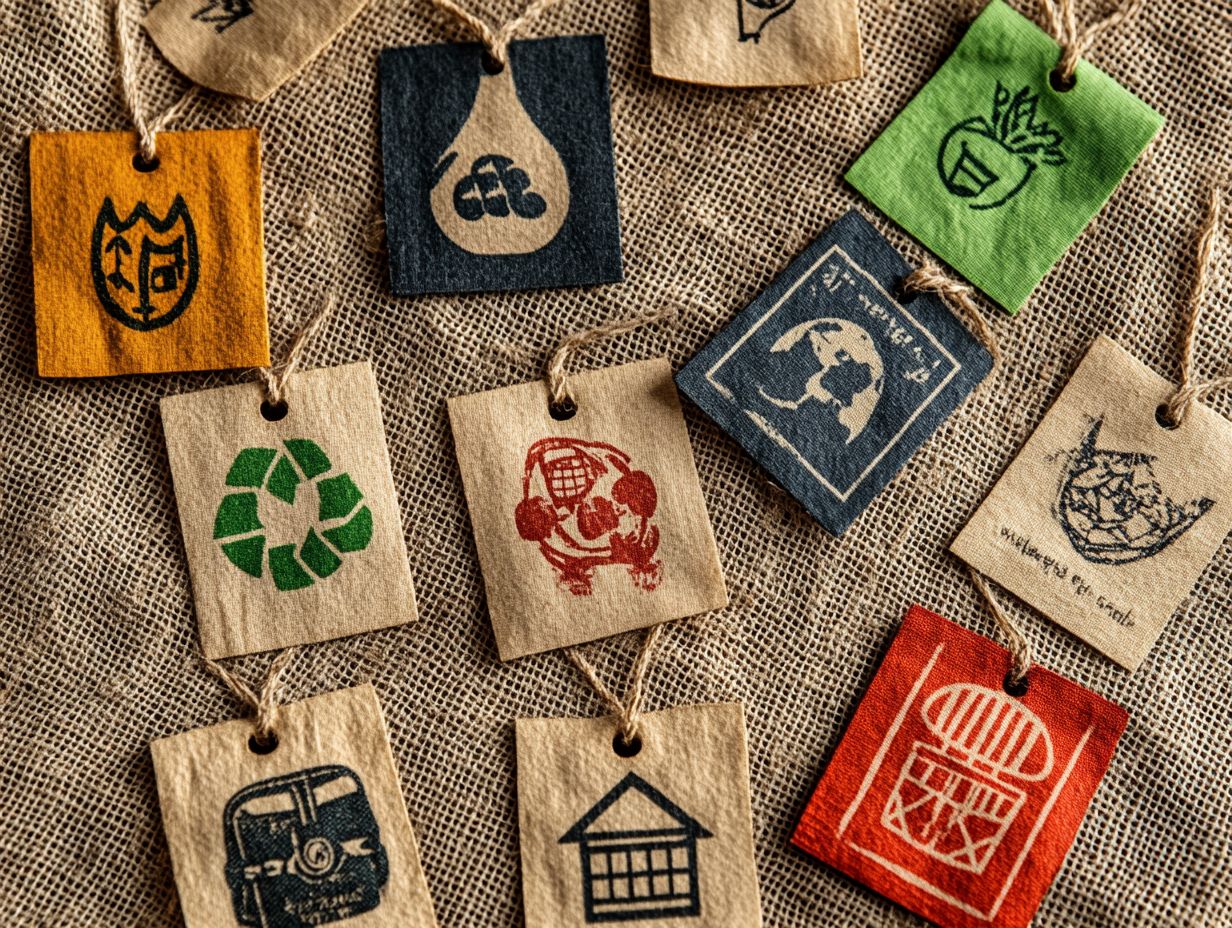
Researching and evaluating a brand’s ethical and environmental practices is essential for consumers dedicated to supporting sustainable fashion.
Examining a brand s certifications, such as those from certified B Corporations, provides valuable insights into its commitment to social and environmental responsibility.
Diving into third-party reviews further illuminates a brand s transparency and ethical production methods.
Understanding the lifecycle of products helps you discern their impact on the planet, fostering a more sustainable circular fashion economy.
This approach champions brands that prioritize ethical practices and incentivizes them to embrace more responsible methods.
Ultimately, you contribute to shaping a market that values sustainability and ethical production.
Making Sustainable Clothing Choices
Embracing sustainable clothing choices enables you, as a conscious consumer, to champion brands that prioritize environmental stewardship and uphold ethical practices.
Tips for Incorporating Sustainable Clothing into Your Wardrobe
Incorporating sustainable clothing into your wardrobe involves making intentional choices that reflect your commitment to ethical production and a system where clothes are recycled or reused. Consider brands like Kotn and Kowtow.
Explore second-hand shops or online marketplaces. You can find unique pieces and reduce waste at the same time.
Understanding certifications, such as those from the Forest Stewardship Council, ensures that the materials in your garments come from responsibly managed forests. This promotes environmental health.
Support brands that prioritize ethical production! It not only boosts your wardrobe but also makes a positive impact on the environment.
By making mindful decisions about what and how much to buy, you play a significant role in fostering a more sustainable fashion ecosystem. You can inspire others to critically evaluate their own purchasing habits.
Frequently Asked Questions
What are sustainable clothing labels?
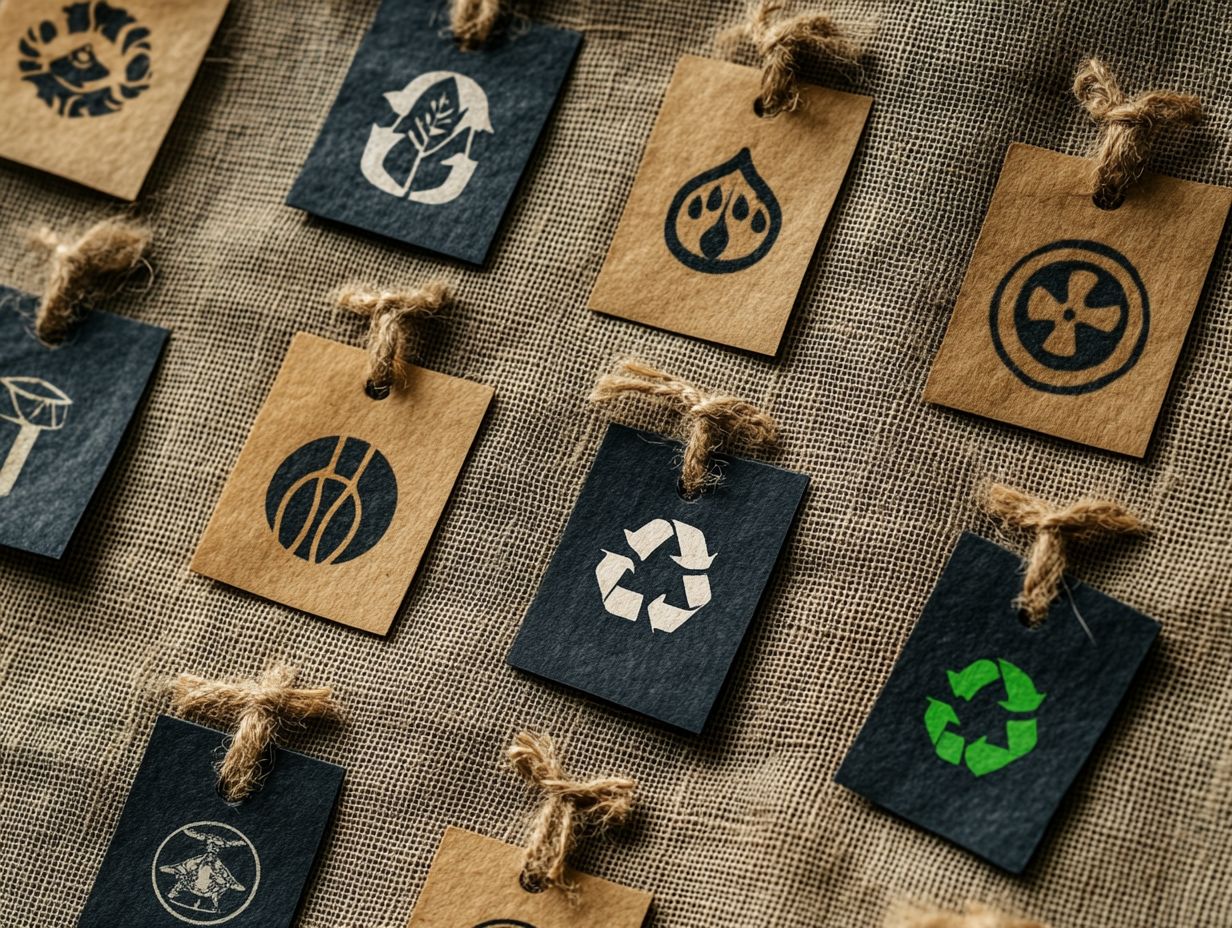
Sustainable clothing labels are brands or manufacturers that use environmentally-friendly and ethical practices throughout their production process. This can include using sustainable materials, fair labor practices, and reducing their carbon footprint.
Why is it important to identify sustainable clothing labels?
Identifying sustainable clothing labels is important because it allows consumers to make informed choices. You can support companies that are committed to reducing their impact on the environment and promoting ethical practices.
How can I identify sustainable clothing labels?
One way to identify sustainable clothing labels is to look for certifications and labels such as Fair Trade, Certified B Corporation, or the Global Organic Textile Standard (GOTS). These labels indicate that the brand has met certain environmental and ethical standards.
What are some sustainable materials used by clothing labels?
Some sustainable materials used by clothing labels include organic cotton, bamboo, hemp, and recycled polyester. These materials are environmentally-friendly because they require less water and energy to produce and have a lower impact on the environment compared to traditional materials like cotton.
How can I research a clothing label’s sustainability practices?
You can research a clothing label’s sustainability practices by looking at their website and reading about their mission and values. Check for any certifications or labels they may have. You can also read reviews and articles about the brand’s practices and transparency.
What are the benefits of supporting sustainable clothing labels?
Supporting sustainable clothing labels not only benefits the environment but also supports fair labor practices. It reduces the use of harmful chemicals and promotes the development of more sustainable and ethical fashion industries.
Many sustainable clothing labels also offer high-quality, durable products, which can save consumers money in the long run.
Explore sustainable clothing today and make a difference!
